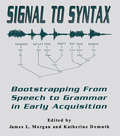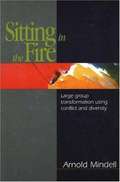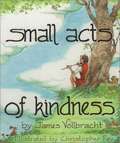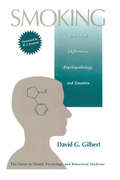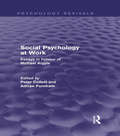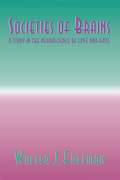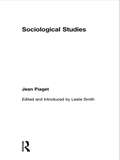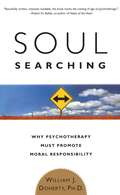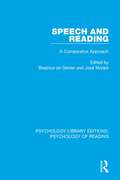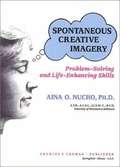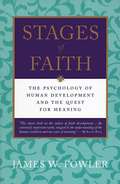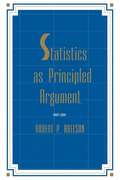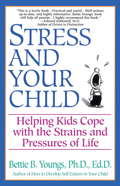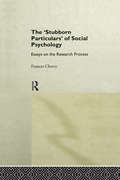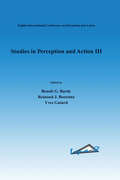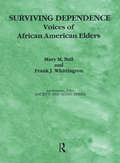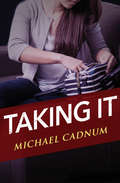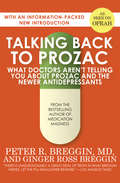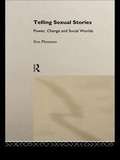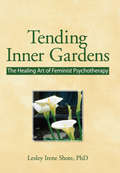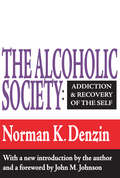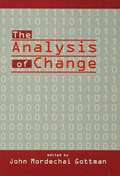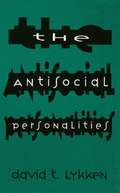- Table View
- List View
Signal to Syntax: Bootstrapping From Speech To Grammar in Early Acquisition
by James L. Morgan Katherine DemuthIn the beginning, before there are words, or syntax, or discourse, there is speech. Speech is an infant's gateway to language. Without exposure to speech, no language--or at most only a feeble facsimile of language--develops, regardless of how rich a child's biological endowment for language learning may be. But little is given directly in speech--not words, for example, as anyone who has ever listened to fluent conversation in an unfamiliar language can attest. Rather, words and phrases, or rudimentary categories--or whatever other information is required for syntactic and semantic analyses to begin operating--must be pulled from speech through an infant's developing perceptual capacities. By the end of the first year, an infant can segment at least some words from fluent speech. Beyond this, how impoverished or rich an infant's representations of input may be remains largely unknown. Clearly, in the debate over determinants of early language acquisition, the input speech stream has too often been offhandedly dismissed as a potential source of information.This volume brings together internationally-known scholars from a range of disciplines--linguistics, psychology, cognitive and computer science, and acoustics --who share common interests in how speech, in its phonological, prosodic, distributional, and statistical properties, may encode information useful for early language learning, and how such information may be deciphered by very young children. These scholars offer a spectrum of viewpoints on the possibility that aspects of speech may provide bootstraps for language learning; contribute important, state-of-the-art findings across a variety of relevant domains; and illuminate critical directions for future inquiry. The publication of this volume represents a significant step in renewing the bonds between two fields that have long been sundered--speech perception and language acquisition.
Sites of Memory, Sites of Mourning
by Jay WinterJay Winter's powerful study of the "collective remembrance" of the Great War offers a major reassessment of one of the critical episodes in the cultural history of the twentieth century. Dr. Winter looks anew at the culture of commemoration and the ways in which communities endeavored to find collective solace after 1918. Sites of Memory, Sites of Mourning is a profound and moving book of great importance for the attempt to understand the course of European history during the first half of the twentieth century.
Sitting in the Fire: Large Group Transformation Using Conflict and Diversity
by Arnold MindellExplores the underlying psychodynamics of dispute mediation and facilitating groups of all sizes by embracing conflict and diversity rather than avoicing them.
Small Acts of Kindness
by James VollbrachtSmall Acts of Kindness Celebrating the power of kindness, this charmingly illustrated book shows children how one small and loving act has the most amazing power and potential. Intended for pre-school children through eight years of age, this inspiring little book offers a traditional message filled with spiritual richness. Small Acts of Kindness leads us willingly from one boy's small hug to the power of God's love for each one of us. Parents and children alike will be inspired by this timeless story.
Smoking: Individual Differences, Psychopathology, And Emotion (Series in Health Psychology and Behavioral Medicine)
by David G. GilbertFirst published in 1995. Routledge is an imprint of Taylor & Francis, an informa company.
Social Psychology at Work: Essays in honour of Michael Argyle (Psychology Revivals)
by Adrian Furnham Peter CollettSocial psychology has much to offer real world problems, especially in industrial and organizational settings. Originally published in 1995, in Social Psychology at Work leading researchers in their respective fields discuss recent findings and their implications for the commercial world of work. All the contributors have been greatly influenced by the late Michael Argyle, to whom this book is dedicated. They examine aspects of the workplace from the perspectives of personality and individual difference, social psychology and organizational psychology. Subjects covered include the effects of age on work, leadership, productivity, how we are socialized for work, stress and anxiety, and the effect of the physical environment on working behaviour. Social Psychology at Work is a rich source book of ideas, research findings and reviews at the interface of pure and applied psychology. It will be important and rewarding reading for all those such as students, consultants and managers and trainers who are interested in psychology at work.
Societies of Brains: A Study in the Neuroscience of Love and Hate (INNS Series of Texts, Monographs, and Proceedings Series)
by Walter J. FreemanThis monograph from a leading neuroscientist and neural networks researcher investigates and offers a fresh approach to the perplexing scientific and philosophical problems of minds and brains. It explains how brains have evolved from our earliest vertebrate ancestors. It details how brains provide the basis for successful comprehension of the environment, for the formulation of actions and prediction of their consequences, and for cooperating or competing with other beings that have brains. The book also offers observations regarding such issues as: * how and why people fall in and out of love; * the biological basis for experiencing feelings of love and hate; and * how music and dance have provided the ancestral technology for forming social groups such as tribes and clans. The author reviews the history of the mind-brain problem, and demonstrates how the new sciences of behavioral electrophysiology and nonlinear dynamics -- combined with the latest computer technology -- have made it possible for us to observe brains in action. He also provides an answer to the question: What happens to a stimulus after it enters the brain? The answer: The stimulus triggers the construction of a percept and is then washed away. All that we know is what our brains construct for us by neurodynamics. Brains are not logical devices that process information. They are dynamical systems that create meaning through interactions with the environment -- and each other. The book shows how the learning process by which brains construct meaning tends to isolate brains into self-centered worlds, and how nature has provided a remedy -- first appearing in mammals as a mechanism for pair-bonding -- to ensure reproduction of the young dependent on parents. The remedy is based in the neurochemistry of sex which serves to dissolve belief structures in order to open the way for new patterns of understanding and behavior. Individuals experience these changes in various ways, such as falling in love, collegiate indoctrination, tribal bonding, brain washing, political or religious conversions, and related types of socialization. The highest forms of meaning for humans come through these social attachments.
Sociological Studies
by Jean PiagetJean Piaget is one of the greatest names in psychology. A knowledge of his ideas is essential for all in psychology and education. Sociological Studies is one of his major works to remain untranslated. Now an international team of Piaget experts has got together to ensure that this important work is available in English. This classic text, exploring the role of social experience in the development of understanding, shows the general perception of Piaget as someone who took insufficient account of social factors in psychology to be false.
Soul Searching: Why Psychotherapy Must Promote Moral Responsibility
by William J. DohertyPaul, a divorced father, wants to back out of his child care arrangement and spend less time with his children. Nathan has been lying to his wife about a serious medical condition. Marsha, recently separated from her husband, cannot resist telling her children negative things about their father. What is the role of therapy in these situations? Trained to strive for neutrality and to focus strictly on the clients’ needs, most therapists generally consider moral issues such as fairness, truthfulness, and obligation beyond their domain. Now, an award-winning psychologist and family therapist criticizes psychotherapy’s overemphasis on individual self-interest and calls for a sense of moral responsibility in therapy.
Speech and Reading: A Comparative Approach (Psychology Library Editions: Psychology of Reading #2)
by Beatrice De Gelder José MoraisOriginally published in 1995, this collection of papers introduced a new dimension to the understanding of reading by focusing on the relation between spoken and written language processing. New perspectives on speech and reading are introduced by highlighting aspects of the two linguistic skills that had received little attention in the past. The comparative perspective adopted in this collection presents an innovative focus on speech and the acquisition of alphabetic reading skill. Major new sources of evidence are discussed, like reading in nonconventional input modalities, braille reading, and speech processing in lip-reading. Contributors also discuss the reading process in non-alphabetic orthographies and the specifics of the reading acquisition problem in logographic or mixed writing systems (like Chinese and Japanese) and their relations to underlying speech representations. A central concern of all chapters is the role of phonological processes in different modalities and writings systems, and at different stages in the reading acquisition process. Drawing on expertise of the contributors, the book presents a novel and varied view of the achievements, the promises and the challenges facing the researcher once the intimate link between speech and reading comes to the foreground.
Spontaneous Creative Imagery: Problem-Solving and Life-Enhancing Skills
by Martin L. Rossman Aina O. NuchoImagery allows us to see where we've been, and remember formative patterns of not only distress but creative coping and strengths. Imagery also allows us to look into the future, not as fortune tellers, but as creative beings exploring possible alternatives. It allows us to take our inner bearings and to set our sights on where we want to go. With this landmark book, Dr. Aina Nucho brings this powerful navigational tool clearly to light as the multifaceted health resource it can be.
Stages of Faith: The Psychology of Human Development and the Quest For Meaning
by James W. FowlerFaith, as approached here, is not necessarily religious, nor is it to be equated with belief. Rather, faith is a person's way of leaning into and making sense of life. More verb that noun, faith is the dynamic system of images, values, and commitments that guide one's life. It is thus universal: everyone who chooses to go on living operated by some basic faith. Building on the contributions of such key thinkers as Piaget, Erikson, and Kohlberg, Fowler draws on a wide range of scholarship, literature, and firsthand research to present expertly and engagingly the six stages that emerge in working out the meaning of our lives--from the intuitive, imitative faith of childhood through conventional and then more independent faith to the universalizing, self-transcending faith of full maturity. Stages of Faith helps us to understand our own pilgrimage of faith, the passages of our own quest for meaning and value.
Statistics As Principled Argument
by Robert P. AbelsonIn this illuminating volume, Robert P. Abelson delves into the too-often dismissed problems of interpreting quantitative data and then presenting them in the context of a coherent story about one's research. Unlike too many books on statistics, this is a remarkably engaging read, filled with fascinating real-life (and real-research) examples rather than with recipes for analysis. It will be of true interest and lasting value to beginning graduate students and seasoned researchers alike. The focus of the book is that the purpose of statistics is to organize a useful argument from quantitative evidence, using a form of principled rhetoric. Five criteria, described by the acronym MAGIC (magnitude, articulation, generality, interestingness, and credibility) are proposed as crucial features of a persuasive, principled argument. Particular statistical methods are discussed, with minimum use of formulas and heavy data sets. The ideas throughout the book revolve around elementary probability theory, t tests, and simple issues of research design. It is therefore assumed that the reader has already had some access to elementary statistics. Many examples are included to explain the connection of statistics to substantive claims about real phenomena.
Stress and Your Child
by Betty YoungsGive your children back their childhood. We like to think of childhood as a carefree, relaxed time of life, but the truth is, children today experience more stress than ever before: parents' fast-paced lifestyles, the frequent breakup of families, urban crime, schools in turmoil, and a host of other problems. However, according to Bettie B. Youngs, Ph.D., Ed.D, one of America's most admired experts on child psychology, children by mastering skills of coping and self-awareness--can actually draw vitality from stress and channel it to promote health, fitness, and self-esteem.Stress and Your Child helps parents understand the pressures that their children face and explores the essential ways to reduce, manage, and prevent stress from birth to age twenty. Dr. Youngs leads parents through each stage of their child's emotional and social development and teaches them: How to recognize the physical and emotional signs of stress in children- How to understand school-related stress, including social pressures, personal safety, and test-taking- How parental stress affects children- and what parents can do to alleviate it- How teaching kids self-esteem and emotional honesty can help them cope wth stress- How diet, physical activity, and realistic schedules can help to minimize stress in children. Stress and Your Child is an invaluable parenting guide. No family can afford to be without it!
Stubborn Particulars of Social Psychology: Essays on the Research Process (Critical Psychology Series)
by Frances CherryThe `Stubborn Particulars' of Social Psychology gives students an alternative approach to social psychology which acknowledges the limits of shared understandings often imposed by class, race, culture, nationality, ethnicity, language and gender. Frances Cherry shows how the generation of hypotheses, experimental practice, the interpretation of results and the process of scientific communication itself are equally framed by historical and cutural context. She discusses how to begin to understand one's own biases and prejudices, and how we create and make sense of our own social psychology as an engaged social critic, rather than as some idealised `objective' scientist. The `Stubborn Particulars' of Social Psychology should be required reading for all social psychology students as an antidote to their course text.
Studies in Perception and Action III (Studies in Perception and Action)
by Benoît G. Bardy Reinoud J. Bootsma Yves GuiardThis volume, a posterbook based on the seventh biennial Conference of the International Society for Ecological Psychology, is a collection of compact empirical and/or theoretical articles on the study of perception and action.
Surviving Dependence: Voices of African American Elders (Society and Aging Series)
by Mary M Ball Frank J WhittingtonTo date there has not been a clear look at the home care experience of older African Americans. "Surviving Dependence: Voices of African American Elders" attempts to meet the need for recording and interpreting the ordinary life of elderly African Americans on their own terms, in their own surroundings, and in so far as possible, in their own words. Ball and Whittington's research is unique in two ways: it focuses on older people who are African American and poor, and it describes the viewpoint of care recipients and their relationships with the public programs designed to help them. This book provides an in-depth view of the experiences of these seven frail elders as both care receivers and as active participants in their own care. The two primary themes the significant disabilities that often accompany old age and the tenacious will and ability to cope possessed by our informants are reflected in the title: "Surviving Dependence."
Taking It
by Michael CadnumA make-believe shoplifter is shocked to find herself actually stealing Anna loves everything about department stores: the smell, the clothes, the crowds. But her favorite things to watch are the detectives. She can spot a store detective a mile away, whether dressed as a tourist or pretending to be a cashier, and she knows just how to fool them: She lingers over an expensive sweater until she catches the detective's eye. When she leaves the store, they stop her, expecting to find the sweater hidden in her purse. But she's fooled them. Anna pretends to be a shoplifter, but she has never stolen anything at all. Until the day the scarf appears out of nowhere. She doesn't remember stealing it, and yet, there it is. As more and more stolen objects begin to appear, Anna worries that her little game is about to push her over the brink.
Talking Back to Prozac: What Doctors Aren't Telling You About Prozac and the Newer Antidepressants
by Peter R. Breggin Ginger Ross BregginA psychiatrist takes a critical look at this SSRI and newer medications that are among the most frequently prescribed drugs in America. Prozac. Millions of Americans are on it. And just about everyone else is wondering if they should be on it, too. The claims of the pro‑Prozac chorus are enticing: that it can cure everything from depression (the only disorder for which Prozac was originally approved) to fear of public speaking, PMS, obesity, shyness, migraine, and back pain—with few or no side effects. But is the reality quite different? At what price do we buy Prozac‑induced euphoria and a shiny new personality? Psychiatrist Peter Breggin, MD, and coauthor Ginger Ross Breggin answer these and other crucial questions in Talking Back to Prozac. They explain what Prozac is and how it works, and they take a hard look at the real story behind today&’s most controversial drug: The fact that Prozac was tested in trials of four to six weeks in length before receiving FDA approvalThe difficulty Prozac&’s manufacturer had in proving its effectiveness during these testsThe information on side effects that the FDA failed to include in its final labeling requirementsHow Prozac acts as a stimulant not unlike the addictive drugs cocaine and amphetamineThe dangers of possible Prozac addiction and abuseThe seriousness and frequency of Prozac&’s side effects, including agitation, insomnia, nausea, diarrhea, loss of libido, and difficulty reaching orgasmThe growing evidence that Prozac can cause violence and suicideThe social and workplace implications of using the drug not to cure depression but to change personality and enhance performance Using dramatic case histories as well as scientific research and carefully documented evidence, the Breggins expose the potentially damaging effects of Prozac. They also describe the resounding success that has been achieved with more humane alternatives for the treatment of depression.Talking Back to Prozac provides essential information for anyone who takes Prozac or is considering taking it, and for those who prescribe it.
Telling Sexual Stories: Power, Change, And Social Worlds
by Ken PlummerThis book explores the rites of a sexual story-telling culture. Taking three major examples - rape stories, coming-out stories, recovery stories - it examines the nature of these newly emerging narratives and the socio-historical conditions which have given rise to them. It looks at the rise of the women's movement, the lesbian and gay movement and the 'recovery' movement as harbingers of significant social change that encourage the telling of new stories.
Ten Thousand Dreams Interpreted or What's in a Dream
by Gustavus Hindman Millerinterpretation of 10,000 dreams
Tending Inner Gardens: The Healing Art of Feminist Psychotherapy
by Lesley I ShoreTending Inner Gardens: The Healing Art of Feminist Psychotherapy transforms the theory and practice of psychotherapy, one that values both the feminine and masculine perspectives. Set within a naturalistic framework, this model utilizes nature’s growing and healing processes. It proposes nature’s seasonal cycles as a model for the psychotherapy process, and author Lesley Irene Shore introduces nature’s seasonal cycle as a model for successful psychotherapy and demonstrates how to tune techniques to the rhythms of each season.Dr. Shore speaks with the voice of an experienced psychotherapist, sharing her struggles with therapeutic dilemmas and addressing issues common to every practitioner. She refuses to present simple solutions to the difficult process of helping people grow, yet offers new ways of thinking about this work. Readers will find this a healing book--for themselves as well as for their clients.The book covers relationship issues as well as the use of language, hypnosis, dreams, and creativity. Specific areas readers learn about include: language--teaches therapists to differentiate between questions that address conscious regions of the mind and ones which communicate with less conscious processes. metaphor--describes ways of working with metaphors to access less conscious processes trauma--explores the effects of psychological trauma and offers tools for healing its wounds psychotherapy process--uses nature’s seasonal cycle to chart the process of psychotherapyTending Inner Gardens transcends the artificial dichotomies currently characterizing much psychological thought. Psychotherapists will be interested in the natural model of psychotherapy which integrates a wide range of ideas and theories, especially the sections on the psychotherapy relationship, dreams, creativity, working with metaphors, language, and the process of psychotherapy. Interesting case studies illuminate this material. Students can benefit from seeing how the tools of psychotherapy are integrated with the art. Laypeople will enjoy reading about Dr. Shore’s personal evolution as a therapist, her life on Harmony Farm, and her cases, which are discussed in detail.While this book is primarily geared toward a professional audience, it attracts a wide range of readers. It should be read by experienced psychotherapists, faculty members, and practitioners, as well as those in training. This would generally include psychiatrists, psychologists, social workers, counselors, psychiatric nurses, and related professions. And while the book presents a primarily verbal, psychodynamic approach toward healing, its theoretical conceptualization will appeal to professionals in healing traditions such as art therapy, massage therapy, and expressive therapy.
The Alcoholic Society: Addiction and Recovery of the Self
by Reece McGeeOffering a unique theoretical foundation to understanding the lived experience of the active alcoholic, Denzin asserts that alcoholism is a disease in which negative emotions divide the self into warring, inner factions, fueled and distorted by alcoholic intoxication. The work is solidly anchored in a long-term study of the socialization experiences that began in alcoholism treatment centers and continue in Alcoholics Anonymous recovery programs. It covers the treatment process, the restructuring of self, the alcoholic's interaction with his recovery treatment program, and the modalities of self-transcendence that result from treatment.
The Analysis of Change
by John Mordechai GottmanContinuity and change have been major concerns of the social and behavioral sciences -- in the study of human development and in the study of processes that unfold in various ways across time. There has been a veritable explosion of techniques for studying change over time which have fundamentally changed how we need to think of and study change. Unfortunately, many of the old precepts and beliefs are still among us. The field of methodology for the study of change is itself ready to change. Recently, there have been many analytic and conceptual developments questioning our cherished beliefs about the study of change. As such, how are individuals to think about issues and correctly analyze change? The chapters in this volume address these issues. Divided into two sections, this book deals with designs that analyze change in multiple subjects, and with change in single subjects and an interacting system. Papers presented in this volume are accessible to scientists who are not methodologists. The character of the papers are more like primers than basic treatises on methodology, written for other methodologists. It is time that people stop thinking in rigid ways about how to study change and be introduced to a range of many possibilities. Change, stability, order and chaos are elusive concepts. The pursuit of the laws of change must be approached in as flexible and creative a fashion as possible. This book should help to lead the way.
The Antisocial Personalities
by David T. LykkenThis volume presents a scholarly analysis of psychopathic and sociopathic personalities and the conditions that give rise to them. In so doing, it offers a coherent theoretical and developmental analysis of socialization and its vicissitudes, and of the role played in socialization by the crime-relevant genetic traits of the child and the skills and limitations of the primary socializing agents, the parents. This volume also describes how American psychiatry's (DSM-IV) category of "Antisocial Personality Disorder" is heterogeneous and fails to document some of the more interesting and notorious psychopaths of our era. The author also shows why the antinomic formula "Nature vs. Nurture" should be revised to "Nature via Nurture" and reviews the evidence for the heritability of crime-relevant traits. One of these traits -- fearlessness -- seems to be one basis for the primary psychopathy and the author argues that the primary psychopath and the hero may be twigs on the same genetic branch. But crime -- the failure of socialization -- is rare among traditional peoples still living in the extended-family environment in which our common ancestors lived and to which our species is evolutionarily adapted. The author demonstrates that the sharp rise in crime and violence in the United States since the 1960s can be attributed to the coeval increase in divorce and illegitimacy which has left millions of fatherless children to be reared by over-burdened, often immature or sociopathic single mothers. The genus sociopathic personality includes those persons whose failure of socialization can be attributed largely to incompetent or indifferent rearing. Two generalizations supported by modern behavior genetic research are that most psychological traits have strong genetic roots and show little lasting influence of the rearing environment. This book demonstrates that the important trait of socialization is an exception. Although traits that obstruct or facilitate socialization tend to obey these rules, socialization itself is only weakly heritable; this is because modern American society displays such enormous variance in the relevant environmental factors, mainly in parental competence. Moreover, parental incompetence that produces sociopathy in one child is likely to have the same result with any siblings. This book argues that sociopathy contributes far more to crime and violence than psychopathy because sociopaths are much more numerous and because sociopathy is a familial trait for both genetic and environmental reasons. With a provocative thesis and an engaging style, this book will be of principal interest to clinical, personality, forensic, and developmental psychologists and their students, as well as to psychiatrists and criminologists.
